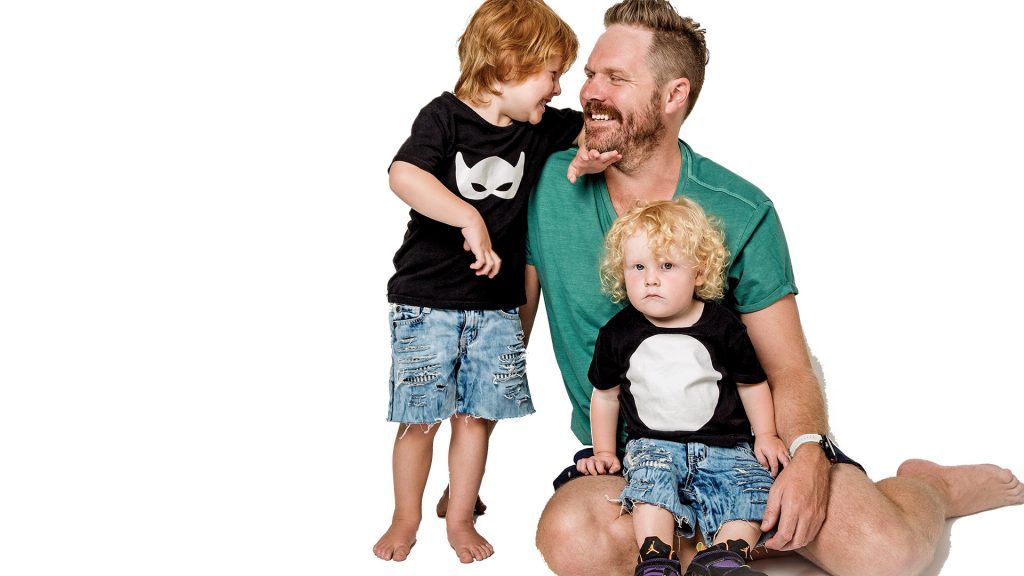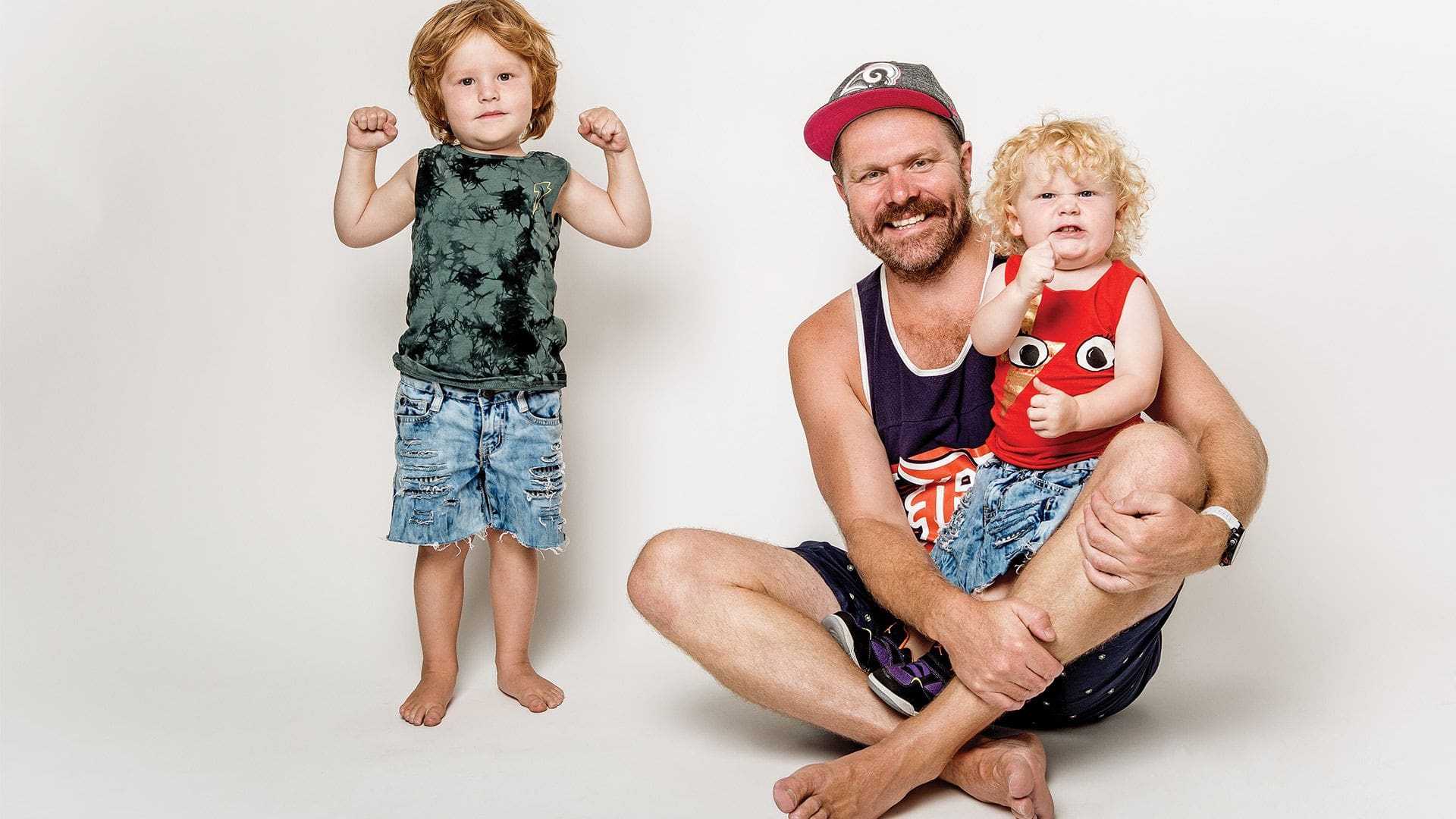Being A Heart Dad
I have to pinch myself as I watch my two boys giggling over their Disney movie – wondering what the hell just happened. The last few months still don’t seem real. Our sixteen-month-old, Jed, is recovering from open-heart surgery, his skilfully darned chest-zipper still inflamed, but not sore enough to stop him cracking up at Timone and Pumba singing “Hakuna Matata”.
Heart Dad is still a fresh title to live up to. Fresh as in ‘new’, as well as ‘cool’. Each day I’m getting used to what this means for our family and how it will affect Jed’s future.
And as I come to terms with the last few months, I realise I’m becoming a Proud Heart Dad. I’m the one pulling up my son’s shirt at kindy, reminding anyone who will listen how brave he is and that every day with your kids is a victory.
A few months ago, just as my wife Sarah had returned to full time work and I’d committed to being full-time dad, I called my wife in a panic. We assumed his small heart murmur was ‘innocent’ and therefore not a biggie. But in a routine check up, some polite but to-the-point cardiologists had just told me Jed had a list of serious congenital heart defects (CHDs), and would require surgery in the next few months. (Important note: don’t tell your wife bad news of this nature over the phone!)
Our hearts bled for our beautiful son, and we knew we were in for a roller coaster. Again.
The cliché “why me” was already a recurring thought for us. Our first-born Freddie was whisked away at birth after a drawn-out labour. Blue, filled with mucus and not feeding properly, he was promptly pricked, prodded and scanned for hours, before under going life saving surgery on day three.
He had a rare condition called Tracheo-Oesophageal Fistula (TOF) and Oesophageal Atresia (OA) – a very serious malformation of the oesophagus (food pipe) and/or trachea (airway) that required urgent repair.
Every TOF/OA child has hugely different outcomes, and thankfully Freddie’s problems are minor compared to other TOF babies we have met. But the trauma of having a child whisked away like that is something my wife would have to work through.
When Freddie was little, she did a large amount of research, met local TOF parents and joined online forums. We learned that it’s essential to understand your children’s individual needs and be their central advocate, but also to focus on the best possible outcomes. Sarah in particular was always worried about worst-case scenarios; would he be able to eat properly? Will reflux damage his oesophagus? Will he get pneumonia and collapsed lungs, like some kids we had met?
We learned that these tough kiddies will surprise you and beat the odds when you least expect it.

This time around with Jed, I begged Sarah to stay off Dr Google and instead focus on the reassuring words of cardiologists and nurse specialists (of course, she had just watched an aortic valve reconstruction on YouTube). Jed has a number of defects, but his ‘bicuspid valve’ and ‘coarctation of the aorta’ would be operated on. It was a fairly common procedure and his outcomes looked great. There is a high chance he will need to be opened up again one day for valve surgery – and the journey will begin again. But let’s take it one step at a time.
In day clinics, we saw heart kids who looked small, pale and weak, and parents who looked weathered by the storm that was their everyday battle. Sarah would often have to step out of waiting rooms to cry about it, it was overwhelming.
Sometimes we both felt like we didn’t have the right to get too upset given that Jed’s problems didn’t seem anywhere near as huge as kids who have severe, complex defects and have multiple surgeries. But, it was still our baby going through this and we were scared as hell.
I learned that CHD’s affect one in every 100 babies born in New Zealand, and Starship treats all of the surgical cases. That’s a big load to manage when you do the math.
In a recent statement, ADHB said there was about 55 to 65 kids on the surgery wait list, up from 40 to 50 in previous years, due to “intensive care unit and surgical capacity”. I was told there was currently one surgeon for the entire country. The surgeon is thankfully exceptionally experienced and highly regarded internationally – but ONE surgeon for a job bigger than Jacinda’s? We had huge concerns over this and how long the wait could be. And I prayed that she looked twice before crossing the road.
It seems that surgical staffing levels and high cancellation rates are a concern for most heart parents at the moment, but it’s my understanding that the clinical team are doing an incredible job to balance government funding and continue to move the most critical cases through the system at the right time.
They have to balance elective surgeries with urgent, acute cases that will occur randomly. Locum surgeons are sent from Melbourne every now and then as well. Plus heart children also share intensive care (PICU) beds and specialist nurses with the whole hospital, which can often shift things.
So although it’s a reality that most surgery dates will get moved a few times in the current climate, that doesn’t help alleviate the logistical, financial and emotional nightmare for families that comes with waiting for elective surgery.
We were lucky enough to be based in Auckland with heaps of family support and flexible, supportive work environments, but for parents and children who reschedule their lives and get mentally prepped for the big day, only to be shifted the day before a flight, is so distressing. I have heard of some families being rescheduled eight times. I think we reached four.
Once we were finally in a hospital, with surgery confirmed for the next day, there was a huge sense of relief – which seems strange given what we had to face. The familiar smell of bleach, consistent beeps and murmurs of the ward were confronting at first, bringing back buried emotions for us both.
But I think we had slightly hardened skin as well. Through Freddie’s journey, we’d seen emaciated babies struggling to breath, and watched them grow over three years into tough, thriving little bruisers. I focused on this as much as possible and welcomed the ward’s playroom, where kids and families shared stories and laughed – albeit in a fog from little to no sleep.
But I also can’t sugar coat that day. It was hell having to wash your baby down with sterilisers, place him on a stark white table amongst machines from the Millennium Falcon cockpit, hold his arms down while they put on a smoky mask, and watch him look up at us and our fake smiles as he slipped into a lucid dream.
I tried to see which machine was the bypass that would literally take over the function of his beating heart for a few hours while they stopped his, to slice and mend and stitch it back together. But my eyes got too glassy.
Sarah and I went for a slow walk in the Domain. We tried to write a kids book, but it turns out this is harder than you’d think, until we got the critical call that Jed was off the bypass machine and his own little heart was pumping again. The floodgates that were severely blocked were opened and the blood was flowing! We knew immediate recovery was still high risk, but the really critical part was over and we could breathe again.
I jumped on social media to contact immediate family and was angry at my news feed. How could so-called friends be chasing the sun on holiday, or complaining about their kids not sleeping last night? But conversely I had to catch myself. People don’t know what this is like, and you wouldn’t really want them to.
To all the other Heart Dads and parents of children with any serious medical condition – you are not alone. Speak up, join a group like Heart Kids and get to know others on a similar path. Although I am forever grateful for the support of my other friends, there is no one that will “get you” like another parent with a sick child.
Heart Kids NZ team was an exceptional support as well. They supported Sarah over the phone, provided wholesome frozen meals on the ward, and importantly they advocate and lobby for kids with CHD’s and their families.
When you’ve seen first hand the strength and resolve of some of these heart kids, it’s humbling like nothing else. Post surgery and parental stress aside, Jed bounced back like a dream. Hakuna Matata indeed.
Although it’s not perfect, I’m endlessly grateful for the world-class health system and healthcare workers we have in New Zealand. I can’t believe nurses are not paid better and we’re not celebrating these talented doctors and support staff everyday, showering them with the world’s finest treasures.
Our good mate, Shortland Street actor Ben Barrington (Dr Drew something), came to visit us in hospital, and he was inundated with attention from fans. Cardiologists literally had to step around them to get past in the hall. Thankfully we all had a laugh afterwards, but I felt a sense of unease, as these professionals are the real heroes (sorry Ben, but you know it’s true).
Our short heart journey was nothing like the struggles some families and kiddies go through, but still, this harrowing time with both of our kids under the knife, has taught me about courage, strength and love. And how bloody lucky we are to live in this country.
Visit heartkids.org.nz for more information or to donate.

